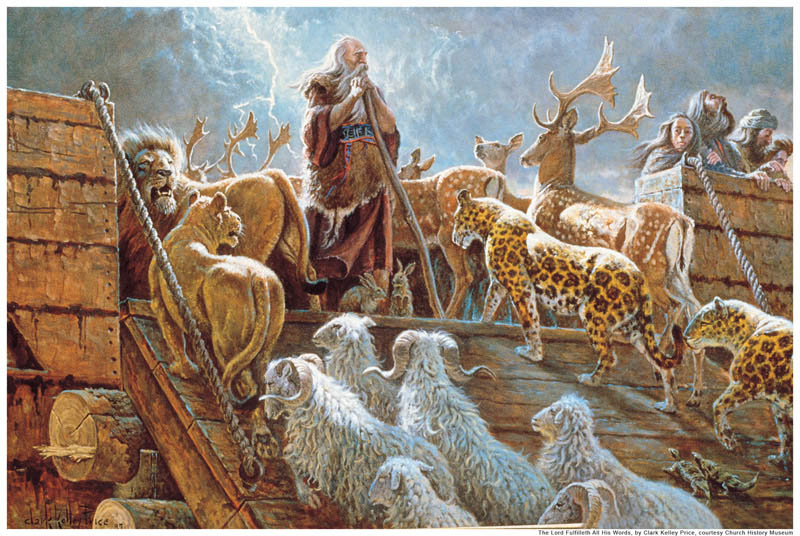It is inspiring to realize that every admonition to which Christ invites us, He has lead the way. Jesus gently implored “come follow me” (Luke 18: 22) and then provided the perfect example of how we should live.
Jesus taught that we should lose our lives for His sake (Matt. 10: 39), and then He practiced this same humble submission in relationship to the Father:
“I seek not mine own will, but the will of the Father which hath sent me” (John 5: 30). “I do always those things that please him” (John 8: 29).
When we think of Christ and the attributes that he possessed and expressed, we may first think of His love and compassion. Of all His attributes of perfection, it is fascinating to note the aspects of character that Christ assigned to Himself. He identified two traits within this sweet invitation:
“Come unto me, all ye that labour and are heavy laden, and I will give you rest. Take my yoke upon you, and learn of me; for I am meek and lowly in heart: and ye shall find rest unto your souls” (Matt. 11: 28, 29).
The New International Version of the Bible translates the words “meek and lowly in heart” to mean “gentle and humble in heart.” These particular attributes reaffirm the prominent theme of Christ’s life: His consistent willingness to humbly yield to the will of the Father.
Jesus taught the disciples that obedience to His Father was more vital than daily food:
“In the mean while his disciples prayed him, saying, Master, eat. But he said unto them, I have meat to eat that ye know not of. Therefore said the sent me, and to finish his work” (John 4: 31-34).

Christ completely relied upon His Father for strength to fulfill His mortal mission; Jesus said “I can of mine own self do nothing” (John 5: 30). Perfectly parallel to the life that He lived in relationship to His Father, the Savior implores us to wholly rely upon Him:
“I am the vine, ye are the branches: He that abideth in me, and I in him, the same bringeth forth much fruit: for without me ye can do nothing” (John 15: 5).
This same sentiment of subordination and obedience was also taught to “other sheep” (John 10: 16) living in the western hemisphere in 34 A.D. After His crucifixion and resurrection, Christ appeared to the inhabitants of ancient America and taught His gospel:
“And this is the gospel which I have given unto you–that I came into the world to do the will of my Father, because my Father sent me. And my Father sent me that I might be lifted up upon the cross; . . . that I might draw all men unto me” (3 Nephi 27: 13, 14).
There is no controversy in Christian concepts about honor and obedience, humility and willingness. These Christlike ways are simple to conceive. Clearly, the core of being Christian is about how we live our lives in the pattern of our Exemplar–Paul called this priority “the work of faith” (2 Thes. 1: 11, 12).
Of lesser importance is a debate about doctrinal details. It is claimed by some, that latter-day saints worship a “different Jesus,” and that certain conceptions about His resurrected body should determine whether one is called “Christian.”
It is true that latter-day saints conceive of Christ’s tangible nature in a way that is different from Christian traditions, from the 4th century on; nevertheless, Mormons conceive of Christ’s resurrected body precisely as the Bible has established (Luke 24: 39). This Biblical witness of Jesus as a glorified, resurrected being, in whose express image we are created (Gen. 1: 26, 27), is indeed different from the unembodied God of 4th century tradition, but it is not different from Christian teachings in the 1st century A.D.
 Correctly conceiving the resurrected Christ is important, but not as important as the weightier matters of His new law: How we should exercise faith in the Savior and live according to His meek and compassionate pattern with humble hearts. Investing time to logically conjure up correct conceptions of doctrinal details of lesser weight, takes time away from the opportunities of “charity” (1 Cor. 13: 1-3).
Correctly conceiving the resurrected Christ is important, but not as important as the weightier matters of His new law: How we should exercise faith in the Savior and live according to His meek and compassionate pattern with humble hearts. Investing time to logically conjure up correct conceptions of doctrinal details of lesser weight, takes time away from the opportunities of “charity” (1 Cor. 13: 1-3).
Central concern for the weightier matters of “the work of faith” (2 Thes. 1: 11, 12) is about, . . . what Christ was about: Doing the will of the Father and showing care and compassion for others. What it means to be Christian has a clear emphasis and priority:
Thou shalt love the Lord thy God with all thy heart, and with all thy soul, and with all thy strength, and with all thy mind; and thy neighbour as thyself. (Luke 10: 27).
Latter-day saints believe that a central aspect of being Christian goes to following the example of the Savior, who is gentle, meek, and humble of heart–and to do “always those things that please Him” (John 8: 29).







What are the pre-4th Century Christian beliefs that are referred to? I assume that it is some view that was condemned at the Council of Chalcedon. The only “unembodied” God that I am aware of in “4th century tradition” is the pre-incarnate Logos of John 1. I am not aware of any teachings of a post-resurrection “unembodied” Jesus. Thanks for any specifics you can provide on the statements in question.
Good one, am truly blessed